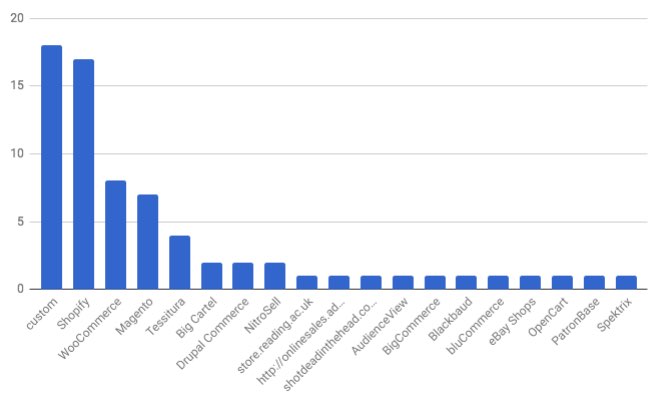The Library contains a spreadsheet with the CMS, ticketing platform, donations platform, and website designers/builders of 350+ of the largest UK cultural organisations.
I’ve just added a column to that spreadsheet showing which ecommerce platforms those cultural organisations are using for their online stores.
Of the organisations in my sample, 22% have an online shop. The others may well have some sort of ecommerce functionality but, rather than selling merchandise, they’ll be focused on some combination of tickets, memberships, and donations.
The chart below shows which ecommerce platforms these cultural organisations are using.

In case the chart is too small for you, or you’re using a screen reader, those are:
- A custom solution
- Shopify
- WooCommerce
- Magento
- Tessitura
- Big Cartel
- Drupal Commerce
- NitroSell
- … and various others.
A few observations
I’m not surprised to see Shopify up there. Most of the online shop launches I’ve seen over the past year or so have been on Shopify. I also wouldn’t be surprised if some of those custom solutions were replatformed onto Shopify over the next year or so.
Not that it’s always necessarily the right choice – copying everyone else is rarely a good guide. There are lots of considerations that might affect your choice of ecommerce platform.
However, from looking at who’s using what, a few trends seem to emerge:
- For a small to medium-sized, standalone offering, Shopify is a popular choice.
- If you’d like to integrate products into a WordPress website then WooCommerce might well make sense. The same goes for Drupal and Drupal Commerce.
- If you have a large shop with some complicated requirements then there may be a case for Magento.
- If you’ve got a very limited offering that’s closely tied to your ticketing offer (ie programmes and vouchers for ice-creams) then you might be able to get away with using your ticketing system.
About The Library
The Library is a constantly growing collection of information and resources related to the digital aspects of cultural organisations.
If you want to know which organisations are using the various ecommerce platforms (and much more besides) then join up and explore the data.